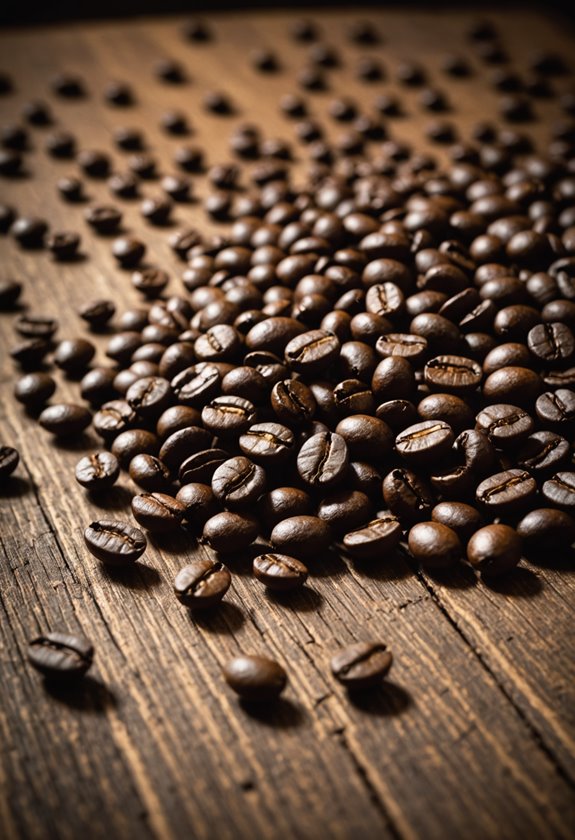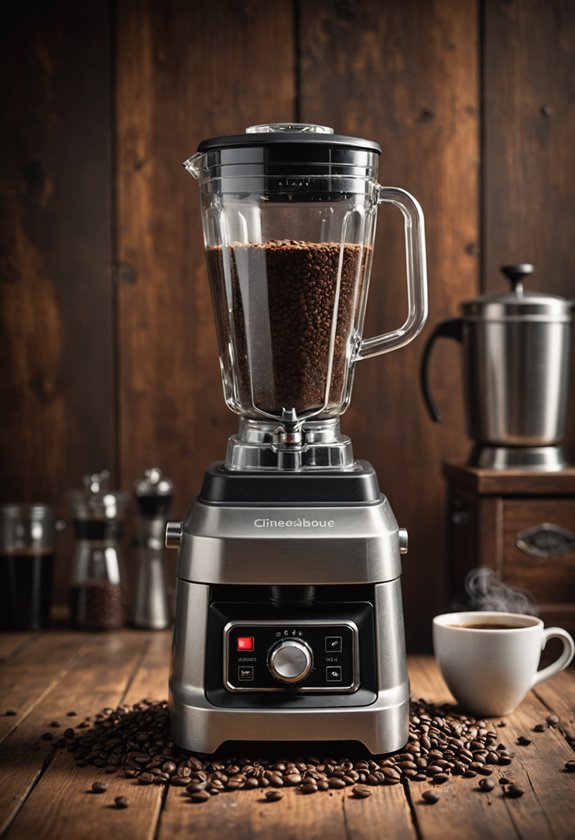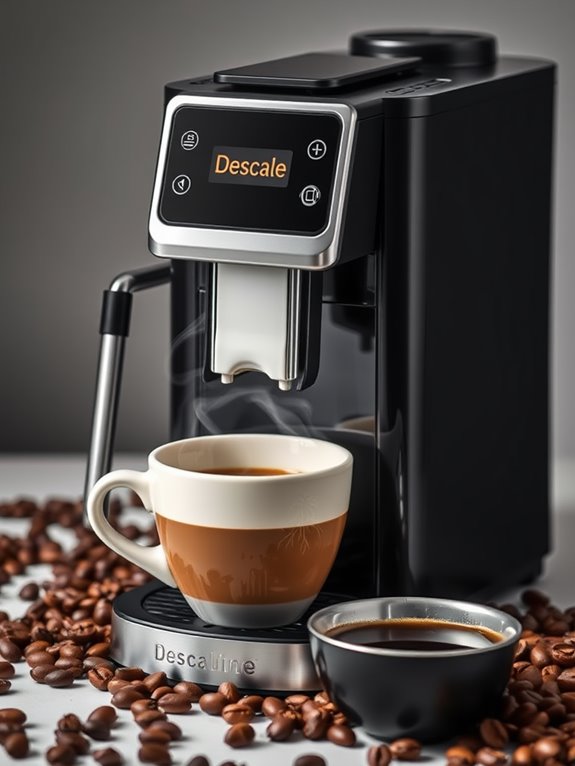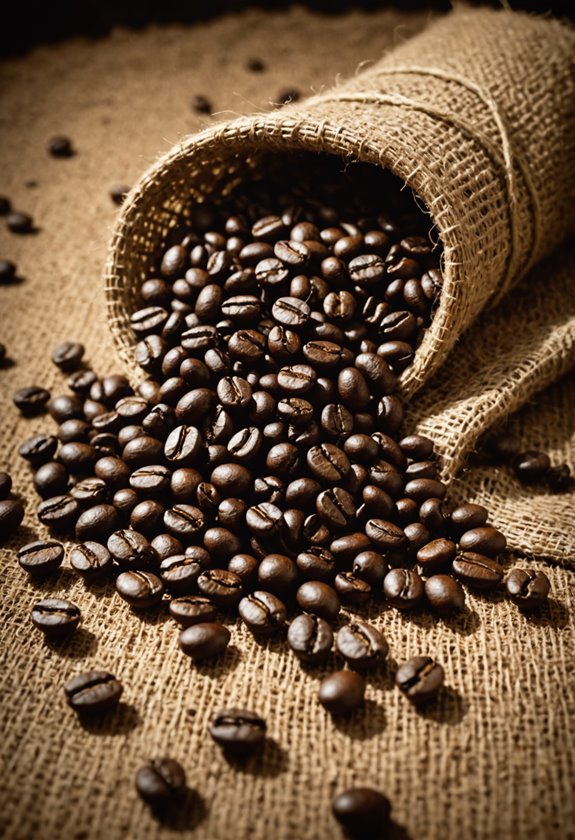Why Do Coffee Beans Expire?
Coffee beans expire due to oxidation, a chemical reaction that occurs when they're exposed to air. This process breaks down the essential oils responsible for their rich flavor and aroma. Whole beans can last 6 to 12 months since their reduced surface area slows oxidation, unlike ground coffee, which lasts 3 to 5 months. Proper storage is vital; keep beans in airtight, opaque containers in a cool, dry place to prevent accelerated spoilage. You'll recognize expired beans by their dull gray color, dry texture, and bitter taste. Let's examine how these factors impact your coffee experience.
Key Takeaways
- Coffee beans expire due to oxidation when exposed to air, which degrades flavor and aroma.
- Whole beans have a slower oxidation rate compared to ground coffee, prolonging their freshness.
- Improper storage, like exposure to light and moisture, accelerates the spoilage of coffee beans.
- Expired beans may appear dull, lack sheen, and develop a bitter or off taste.
- Freshness is best maintained by storing beans in airtight, opaque containers in a cool, dark place.
Factors Affecting Coffee Freshness

When it comes to keeping your coffee fresh, understanding the factors that affect its freshness is essential. Coffee beans are perishable, and their freshness is primarily influenced by exposure to air. This exposure triggers the oxidation process, which degrades those aromatic compounds you love. The roast date is also vital; ideally, you should consume coffee beans within 5 to 30 days post-roasting for the best flavor. For optimal results, grinding before brewing will help preserve the essential oils and provide the best taste experience.
Whole Beans vs. Ground Coffee
Whole beans have a longer shelf life than ground coffee. With less surface area exposed, whole beans can last between 6 to 12 months. In contrast, ground coffee typically maintains its freshness for just 3 to 5 months.
The reduced surface area of whole beans helps in slowing down the oxidation process, making them a better choice for extended freshness.
Indicators of Freshness
You can gauge a bean's freshness by its appearance and aroma. Fresh beans often have oils on their surface and emit a strong aroma.
Stale coffee beans, however, tend to lack these aromatic compounds and appear dull. Using an airtight container can further preserve freshness by minimizing exposure to air, extending the beans' shelf life.
Proper Storage Techniques
Having understood the factors that affect coffee freshness, let's focus on proper storage techniques to maintain your beans' quality.
To store coffee beans effectively, opt for an airtight container. This choice will minimize exposure to air, helping your fresh roasted coffee beans maintain their lively flavors longer. Light exposure can be detrimental, so select an opaque container to shield the beans from harmful rays.
When deciding on a storage location, aim for a cool, dark, dry place at room temperature. Such conditions prevent heat and light from accelerating the degradation of your beans.
It might be tempting to refrigerate or freeze them, but resist the urge. These environments can cause condensation, leading to moisture damage and compromising your coffee's integrity.
To guarantee your coffee beans stay fresh, seal containers tightly after each use. Regularly check both the seal and storage conditions to prolong freshness.
By consistently monitoring and adhering to these techniques, you'll enjoy the full-bodied taste of your coffee for longer.
Let's investigate the impact of light, air, and temperature on coffee quality, understanding how these elements can dramatically affect the lifespan and aroma of your beloved beans.
For the most flavorful cup possible, grind your beans immediately before brewing to preserve their essential oils and aromas.
Signs of Expired Coffee Beans

Recognizing expired coffee beans is essential to preserving the quality of your brew. Coffee beans can go bad, losing their lively aroma and rich flavor profile. Stale coffee beans often lack the inviting scent that fresh beans provide, as volatile compounds break down over time.
Let's investigate more signs of expired coffee.
Visual Appeal and Texture
One of the first signs of expired coffee is a change in their visual appeal. Fresh beans have a rich brown color, but when they expire, the beans might turn a dull gray.
Another indicator is the texture. Fresh beans usually have a slight sheen from natural oils, whereas a dry, grainy texture suggests staleness.
Taste and Spoilage
A bitter or off taste during brewing is a clear sign your coffee beans have passed their prime. Instead of a well-rounded, rich flavor profile, you might experience an unpleasant bitterness.
Always check the expiration date, but remember that visible mold or foreign particles indicate spoilage, making the beans unsafe to consume.
To maintain optimal freshness, storing beans in airtight containers away from light and moisture can significantly extend their shelf life.
Comparing Whole and Ground Coffee
While both whole and ground coffee contribute to your morning ritual, understanding their differences can enhance your coffee experience. Whole coffee beans generally have a longer shelf life compared to ground coffee beans. When stored correctly, whole beans stay fresh for 6-12 months, but once opened, aim to consume them within three weeks to preserve their flavor and aroma.
Ground coffee, on the other hand, has a shorter shelf life of 3-5 months, and once opened, it's best consumed within two weeks.
Let's examine why ground coffee's flavor diminishes faster. Due to its increased surface area, ground coffee is more susceptible to oxidation. This process leads to a loss of essential oils and volatile compounds, causing a decrease in flavor and aroma. As a result, storing whole coffee beans and grinding them at home can provide coffee lovers with a more flavorful cup. Brewing techniques can be optimized by investing in a quality grinder for the best possible taste.
For coffee enthusiasts keen on maximizing their coffee experience, choosing whole beans is often recommended. With proper storage, they maintain their quality longer, offering a richer, more aromatic brew when freshly ground.
Best Practices for Brewing

To brew the perfect cup of coffee, focus on a few key practices that will enhance your experience.
First, freshness is key—use freshly roasted coffee beans within 5-30 days after roasting to capture the best flavor profile and aroma. As time progresses, coffee loses its lively taste, so prioritizing fresh beans is vital.
Next, consider your brewing temperature. Aim for a range between 195°F to 205°F to guarantee proper extraction, which will enhance the coffee's taste.
Water quality also plays a pivotal role. Always use filtered water to prevent impurities from affecting your coffee's flavor.
Grind size is another important factor. Adjust according to your brewing method: use finer grinds for espresso and coarser grinds for methods like the French press. This guarantees that the extraction process is just right for each method.
Finally, don't overlook your brewing equipment. Regularly clean and maintain it to avoid residue buildup, which can alter the taste of your coffee over time.
By following these best practices, you'll brew coffee that's consistently enjoyable and satisfying.
Let's investigate these practices to make certain each cup is as pleasing as the last.
Conclusion
Now that you know why coffee beans expire, you can make smarter choices for your caffeine fix. Pay attention to factors like storage and freshness to enjoy every sip. Whether you prefer whole or ground beans, understand the signs of expiration to keep your coffee tasting its best. By following best brewing practices, you'll not only maximize flavor but also appreciate each cup's unique qualities. So, let's investigate the world of coffee with newfound knowledge and confidence!







